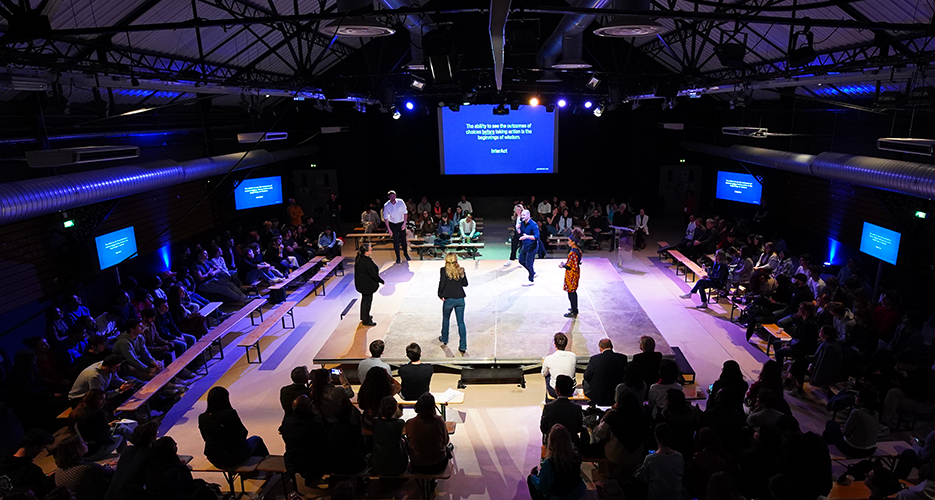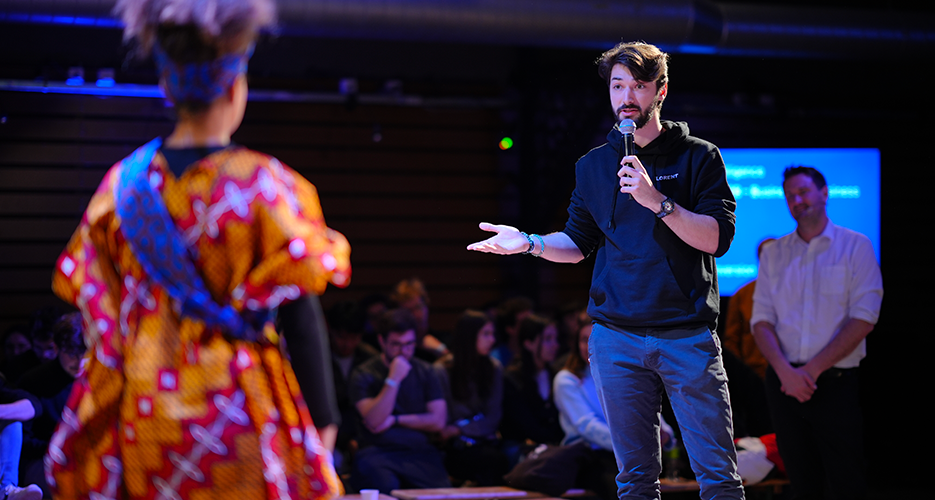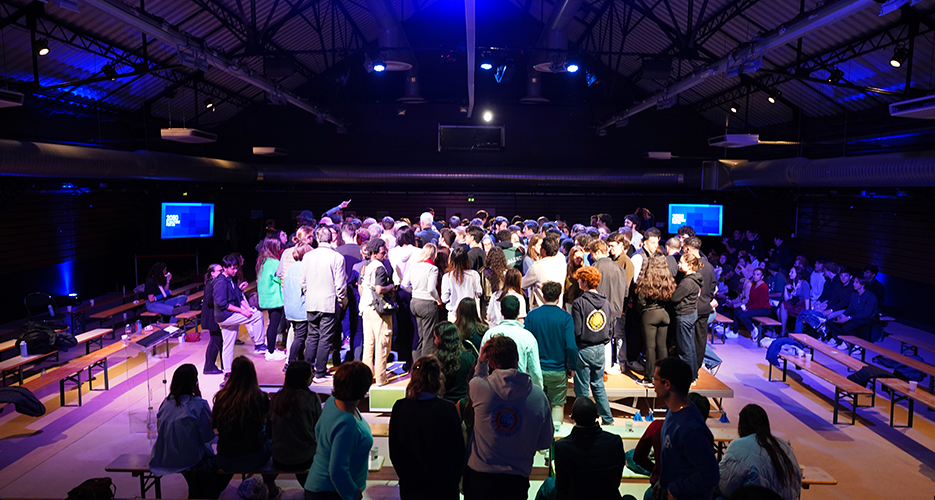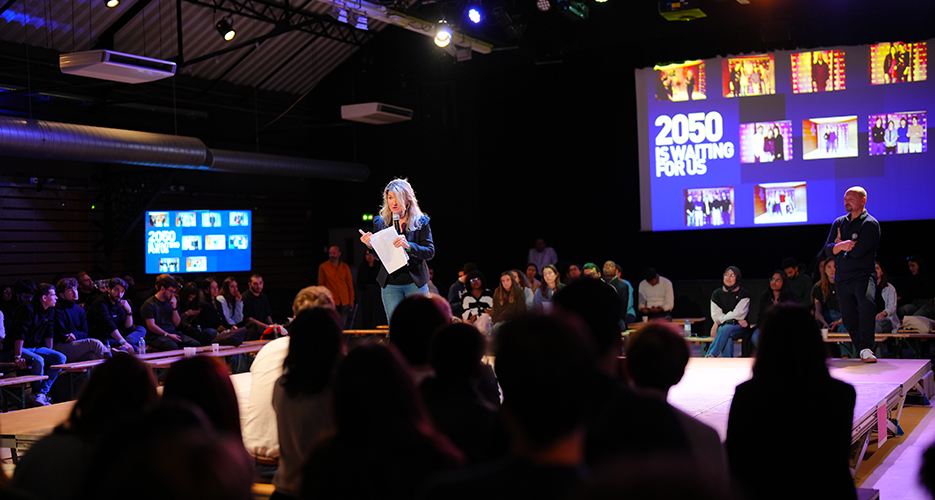2050NOW Brings HEC Students
2050NOW Brings HEC Students Closer to Sustainability Challenges of 21st Century16 months after launching the Impact Company Lab, HEC delivered an immersive and scenario-based learning experience for students, academics and businesses. These included the global companies Schneider Electric, Mastercard, Veolia, Avanade and Western Union. The cross-generational, cross-cultural and cross-functional experience, called 2050NOW, explored the critical role of future-focused business decisions in steering a socially just transition. Part ONE of our coverage described the event’s key objective of leading mindset changes by driving a better understanding of the longitudinal impact of global megatrends in the megacities of the world. In Part TWO, we land in the first of eight megacities the Lab is focusing on, Kinshasa.

We know that several mega trends and forces in societal development, will shape our common future: exponential population growth; asymmetry of wealth and perspectives; fundamental disruption due to climate change and new technologies. And we also know that the disruption, challenges AND opportunities will be concentrated in the most rapidly growing megacities, principally in the Global South.
To explore these realities, over 300 participants travelled back and forth in time in the space of an afternoon, seeking to understand the impact of business decisions on the world’s shared future. They zoomed into potentially real case scenarios in the city of Kinshasa, the Democratic Republic of Congo’s capital.
The organizers called the megapolis a “just transition hotspot” from which the Impact Company Lab’s two directors, Maureen Sigliano and Marieke Huysentruyt, had returned from a 10-day assignment in Kinshasa, one of the world’s fastest growing megacities. There, they met and interviewed a variety of stakeholders already dealing with the challenges of tomorrow. What they heard and saw fundamentally confirmed their conviction that the Impact Company Lab & its business partners must include the voices of the places which have most at stake as they evolve their business models and transform the future.
Operating With New Economies
Sigliano and Huysentruyt kicked off the immersive experience in April by sharing a powerful sensory summary of their learning expedition. This helped identify the needs of the Global South as a starting point. The co-directors also pinpointed the dilemmas faced by these megacities of the world to raise audience awareness of the challenges that leaders must confront but also the opportunities that will arise in doing so. The experiential event encouraged participants to develop the necessary skills to operate in these new and increasingly powerful economies. The importance of cultural fluency and deeper, multi-dimensional and multi-disciplinary perspectives emerged as a must for business leaders who strive to drive a just transition for all.
Forging Business Policy for the Next 26 Years
Once the scene was set, the role-playing began. Participants were invited to imagine the future, make business decisions and see their long-term impacts. Four professional actors from Yes Indeed (a consultancy that delivers interactive programs intended to help drive change) catalyzed joint exercises. These harnessed the collective intelligence drawing from the 4,500 years of accumulated experience present in the hall. The expert actors guided the audience into scenes from today, and then projected them into years 2035 and 2050.

The role play centered on a personality named ‘Adama’ a young Kinshasa businesswoman striving to build and adapt the activities of her European employer to her native DRC. The resulting play, enacted in a highly engaging and playful environment, was both disruptive and thought-provoking.
“The combination of interactive theater and deep dives into megatrends and megacities was particularly powerful,” said HEC MBA student Romaric Ngambo after the event. “It brought home the challenges and opportunities in these environments. When I found out that Kinshasa is set to become the world’s most populous city by 2075 it made me reconsider the scale and speed of urban growth and its implications. The whole experience really emphasized the importance of incorporating long-term strategic foresight into policymaking and business decisions. Paradigm shifting in many ways!”
Sustainability & Organizations Institute’s Academic Director Rodolphe Durand sharing his vision with Adama.
Lively Public Debate to Offset 2050 Challenges
The exchanges, enacted and led by the four professionals then leapt to 2035 and a glimpse of Kinshasa in 11 years’ time. Temperatures had risen to 43°C, imported food was superseding local products (despite immense fertile land and water access), Artificial Intelligence was transforming the workplace more rapidly than the exponentially growing talent pool could keep up with, and value creation opportunities were being bypassed.
15 years further down the road, and the DRC of 2050 was experiencing terrible deforestation and devastating climate change. Fundamental questions on the ownership of the Congo River dominated public debate. Adama was struggling to balance local demands for more access to a balanced life. She wrestled with structural questions about value creation, and the pressures this was putting on her country’s infrastructure. A business leader present ,Yves-Marie L, noted: “I gained new perspectives on where the world’s real growth will be; on the realities of the megacities; on how fast change will be happening and where it will happen.” He continued: “I became very much aware of how France-focused current perspectives are here. We are off the mark! This 2050NOW event made it clear that, as leaders, we need to think much broader. It made it clear that there are substantive challenges that are not on our radars. These topics, which are key to driving sustainability, need to be brought to life more frequently, more urgently, more broadly. But they are not. HEC needs to continue on this path. We need to push the media too. That’s what thought leadership is all about…”

More Local Input and Benefits
The audience in the Vieux Marché, composed of 38 nationalities and dominated by the 240 M1 and MBA students present, circled these new challenges. Several people argued that local business communities and employees must be listened to more and trusted in decision-making. “Culture eats strategy for breakfast,” quipped an M1 student from Picardie, paraphrasing the well-known management consultant Peter Drucker. “Business leaders need to make inclusion their key word,” added an academic. “You must align your interests with those of the local population.”
Another MBA student said he was surprised that profits in 2050 will continue to take a priority over sustainability goals: “These corporates need to accept the possibility of degrowth and orientate their company priorities with those of the public sector.” A controversial proposition by another participant was to nationalize the Congo River which courses its way through the entire region. To loud applause, another student suggested that the problems imported from the Global North need to be counterbalanced by issues like sustainable energy and local infrastructure. Finally, an HEC leader insisted on the need to “re-engineer multi-lateral financial deals to ensure value is also created for the people of DRC.”
Organizers Applaud Public’s Trust
By the end of the event, the public’s perspectives of the future had clearly shifted. However, on this gray April afternoon it also became evident to the organizers that such an ambitious and somewhat disruptive endeavor also may need closer guidance. Granted, the more senior participants appeared to show unique engagement to complement their heightened experience, thus proposing ways forward that were both effective and just. But, in parallel, some of the younger students asked for more context, framing and academic guidance The four-hour experiment revealed both its unique potential and the challenges of using interactive theater and collective intelligence to project oneself into an unknown future to address sustainability issues.
Maureen Sigliano nevertheless applauded all the participants for their engagement throughout the experiment: “We need to keep these conversations going, adding more and more perspectives in our ongoing deliberations. This is key. We must understand value chains and the places where challenges are concentrated. The interactive play today allows us to deep dive into issues that are bound to spread throughout businesses in the coming decades. They showed our blind spots, biases and tensions. These will emerge as we strive to address sustainability more systemically. Today also shed a light both on the importance of strategic thinking and our agility as we think about a just transition for all. When it comes to impact, we just cannot compete with each other. We need a shared, broader, clearer, more tangible vision of our common future."
Meanwhile, Marieke Huysentruyt underlined the importance of trust that the participants displayed in participating actively in the interactive session. She pointed out the unwanted ripple effect of company decisions: “Humans are basically wired for the here-and-now. This needs to change and 2050 is far enough for us to build change, but close enough to imagine it.” Afterwards, an HEC student applauded the initiative: “This program has changed the way I approach the view of a company's mission. 2050NOW made us think broadly about the future and how we want to shape it: things that we do not yet talk about enough in class.” Her vision reflected the 544 words suggested by the audience in looking into this future: climate change, war, technology, flying cars, AI, carbon neutrality were just a few.

Moving forward, the organizers insisted it is important to build on this first edition of 2050NOW. “Next time round, there will be a clearer scope for discussions to avoid getting dispersed and to reach closure” said Sigliano. “We also must inject a higher volume of expert insights to enhance key learnings.” Huysentruyt added: “We will also introduce more interactive sessions to further encourage collective intelligence and provide concise summaries of key takeaways.” For both academics, this will enrich participants' experiences and ensure they leave with actionable insights. “These adjustments will be essential for future immersive events to ensure the concept of interactive learning is fully leveraged,” concluded Sigliano. “That will effectively drive mindset shifts and inspire more longitudinal and collective action towards sustainability goals.” To which Huysentruyt added: “The first edition of 2050NOW was a milestone for HEC’s Impact Company Lab. We encourage our partners to take a more prospective, inclusive and systemic approach to sustainability.”